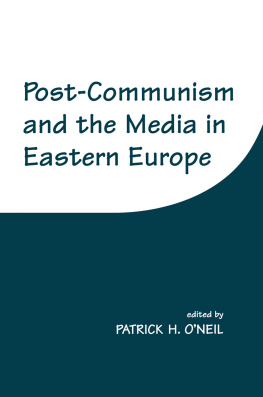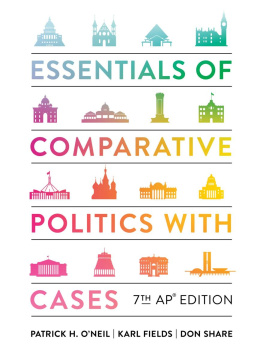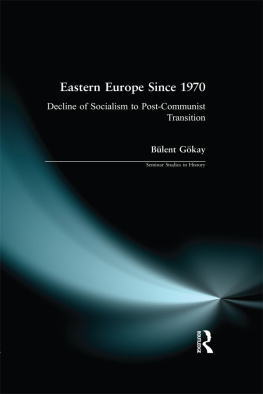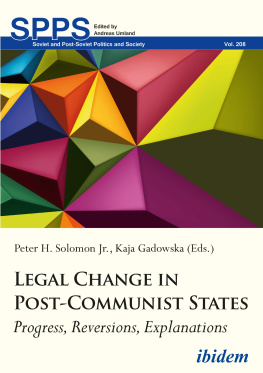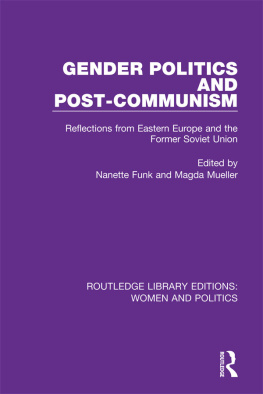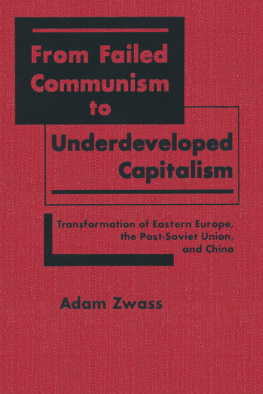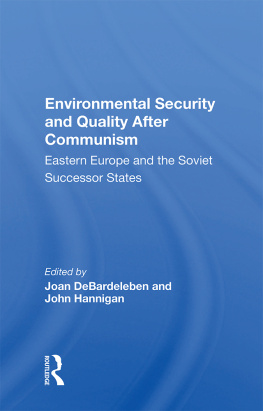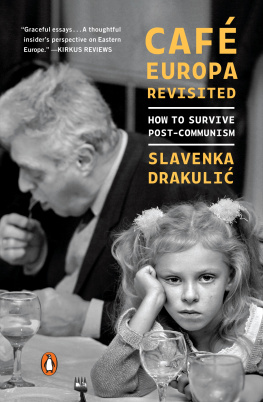First Published 1997 by
FRANK CASS AND COMPANY LIMITED
Published 2013 by Routledge
2 Park Square, Milton Park, Abingdon, Oxon OX14 4RN
711 Third Avenue, New York, NY, 10017, USA
Routledge is an imprint of the Taylor & Francis Group, an informa business
Copyright 1997 Frank Cass & Co. Ltd.
British Library Cataloguing in Publication Data
A catalogue record for this book is available from the British Library
Library of Congress Cataloging-in-Publication Data
A catalog record for this book is available from the Library of Congress
This group of studies first appeared in a Special Issue on Post-Communism and the Media in Eastern Europe of The Journal of Communist Studies and Transition Politics, Vol.12, No.4, December 1996, published by Frank Cass & Co. Ltd.
All rights reserved. No part of this publication may be reproduced, stored in a retrieval system or transmitted in any form, or by any means, electronic, mechanical, photocopying, recording, or otherwise, without the prior permission of the publisher.
ISBN 13: 978-0-714-64765-4 (hbk)
ISBN 13: 978-0-714-64311-3 (pbk)
Introduction: Media Reform and Democratization in Eastern Europe
PATRICK H. ONEIL
Patrick H. ONeil is an assistant professor in the Department of Politics and Government at the University of Puget Sound, Tacoma, Washington, USA.
Given the role of mass communication in the maintenance of communist authoritarianism, it is not surprising that the abandonment of censorship gave way, across the Eastern Europe, to a flourishing of the press, as new titles in unaccustomed areas burst forth. The notion of a free press is central to many models of democracy, and this new development was therefore warmly welcomed. However, experience in a number of countries has shown an inability on the part of the societies concerned including the public, the politicians and the journalistic profession to assimilate this freedom and use it in ways that sustain the establishment of democratic politics. The significance of freedom of information for the functioning of democracy is such that the development of the institution of the press and its relationship with government merits serious study.
What are the prospects for free and open media in Eastern Europe? This is a question that lacks a definite answer and is still a source of dispute. While the revolutions of 1989 were seen as a victory for liberal values over authoritarianism, in subsequent years it has become clear that the absence of communism does not alone lead to democracy by default. Rather, open societies must be built (or re-built), pulling down old state structures that served to centralize political power. Ideology and slogans may quickly vanish from the scene, but many of the organizational aspects of communism are less easily undone. The challenge is not just to replace such discredited structures, but to decide and agree on what they should be replaced with.
One of these structures is obviously the media. Under socialism, it was generally accepted that the media served as a transmission belt not from the masses to the party, in a democratic-centralist fashion, but rather from the party to the people, as an important form of control over information and society. How knowledge was disseminated and portrayed was vital for the survival of communism, stifling alternative concepts or critiques of the existing order. Indeed, the media became one of the battlegrounds of the cold war, as the USSR, its satellite states and the Western powers engaged in their own propaganda campaigns over the nature of East European societies. For Western scholars themselves, the media in Eastern Europe were nothing if not Byzantine: research took the form of code-breaking, reading between the lines in order to glean and deconstruct the real messages behind the distortions. Allegory and double meanings, the particular allegiance of newspapers to their partystate bosses, even the order in which the names of politicians were listed: these features were often sifted through, in a Kremlinological approach to the region that sought to make some sense out of a cryptic press.1
Given the role of mass communication in the maintenance of authoritarianism, it is thus not surprising that one of the most important impacts of the collapse of communism was the sudden torrent of information that burst forth. The monopoly of information gave way to a rapid and diverse expansion of the press. Newspapers and magazines appeared overnight, some emerging after years as samizdat publications; revelations of the crimes of the past and of national history before communism, and speculations on the future of Eastern Europe, came out of the realm of private conversation and into that of public discourse; local views, so often buried under central party rhetoric, suddenly appeared, loudly and angrily. Eastern Europe truly became an example of information overload, where the past and the present were being rewritten from day to day.
But the expansion of press freedom took place in a period of real transition, where old rules had lost their legitimacy and new ones had not yet been promulgated to take their place. Openness created cacophony, and the expansion of press diversity also created the means by which old hatreds could be publicly expressed. Real news often gave way to sensationalism, yellow journalism and tabloid coverage. Often, after the initial euphoria, many programmes or publications found they lacked a large enough audience to survive in a new system of profit and loss, and quickly folded. Foreign capital in many countries came to dominate the most important media assets, raising questions about information monopolies and external control all over again.
At the governmental level as well, the new democrats were often less than thrilled with an open press. State-run television and radio have in many cases developed into the mouthpiece of new regimes, little different from their role under state socialism. Censorship laws have been resurrected as a handy tool to stifle those who criticize the government. Often, economic pressure serves the same purpose. Between market and state, the media continue to run the risk that the power over information will be reconsolidated into the hands of a few, a re-tatisation to the detriment of civil society.
While these issues seem a vital part of the success or failure of democracy, in Eastern Europe or elsewhere, we know little about the relationship between media reform and the formation of stable democracy. For example, in the West in recent years research on the media has grown immensely, critically investigating the concept of a free press and the often negative interaction between the media and democracy.2 These discussions are valuable and draw conclusions that are applicable in a number of different cases, but often they start with the assumption of a stable, liberal democratic order. There is general agreement among Western social scientists that democracies depend on a free press; however, studies of the interrelationship between the media and democracy have paid little attention to how a free press forms in newly democratizing societies. Where media systems are emerging from a long period of authoritarianism, as in Eastern Europe, what impact media structures in transition have on the new political order, and vice versa, requires further investigation.3 Here we confront an entirely different set of circumstances, which require an altogether different set of questions.


